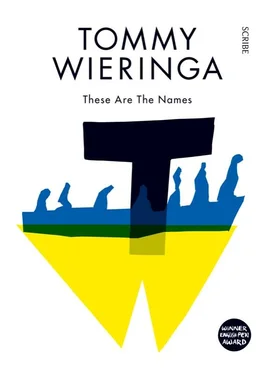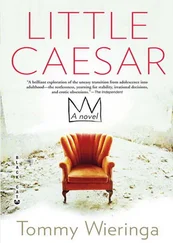The mountains produce tough, bent people. They live and die just as their ancestors did, while in the valley the new century has begun. The new era makes its way uphill in bits and pieces; it reaches them in strange, convoluted morsels, free of the surroundings that explain it and lend it its logical status. It generates fear, but also hope — it means they won’t have to go on lugging burlap bags of earth up the hill till kingdom come, to replace the soil lost to wind and wash.
A family equips a pioneer to make the journey to the distant world. Another follows. Never before have young people left the village to make such long trips, for such uncertainty.
Those who remain behind watch and pray; they wait tensely for the first reports of plenty.
Far away, a boy carves his way in the world. He has traded in the alliance with the soil for a wandering existence; the wind blows him across the steppes. Today he saw a woman eating dirt. He has carried so much soil uphill on his back, but eat it? Never. It’s filthy, it’s not done, it can’t be anything but sinful. And along his way he has seen almost every sin you could imagine — there are so many more of them than he’d ever realised!
He knows that he can never go home again. He has crawled out through the keyhole, and can never get back in.
‘Goddamn it,’ the man from Ashkhabad said that evening. He stared in amazement at the tooth he held between thumb and forefinger. Now there was a gap in his gold-plated incisors. Cautiously, he felt at the others. ‘I could pull them right out of my head,’ he said sadly.
Vitaly lay down and rolled himself up in plastic and rags. He was withdrawing into himself, further and further. He hadn’t said a word all day; the pain had gained the upper hand. His being was concentrated around the burning blemish; he wrapped himself around it and no longer thought of anything else. The pain was unshareable and solitary.
From not far away there came a sound. They stood up. In the distance they saw the black man, a shimmer of rain between them. ‘Goddamn it,’ the man from Ashkhabad said again. He held the stick tightly in one hand. ‘Africa!’ he screamed. There was no reply. He held his hands to his mouth like a megaphone. ‘Hey, Africa!’
The black man unfurled his plastic and disappeared beneath the horizon of grass.
‘What do you want from us?’ the man from Ashkhabad yelled.
The plain sang out.
The poacher and the man from Ashkhabad took a few steps in his direction, but there was no energy in their movements. The woman and the boy looked at their wavering backs.
‘Finish him off,’ came Vitaly’s voice from under the plastic. ‘For Christ’s sake, just fucking finish him off.’
The man from Ashkhabad wheeled on him. ‘Shut up, slum rat. Why don’t you come out here and do it yourself?’
‘Sniveling shits,’ they heard from beneath the dark pile.
The boy felt a burning desire rising up — that the man from Ashkhabad would take his stick and pound the pile of rags until the flux of filthy, blasphemous words came to an end. To see the blood flow out from under it, silenced at last.
The poacher stared at the spot where the black man had vanished into the grass. He just stood there, and no one knew what was going on inside him. Motionless as a donkey, he was. Maybe he was thinking the same thing.
CHAPTER TWENTY-THREE.A theological debate
‘Why don’t you just start reading?’ Rabbi Eder said in annoyance. His guest never stopped asking questions. Beg took home a pile of books from the synagogue. At the table in his living room, he started reading. It wasn’t long before his legs started shimmying. His scalp started itching. Because the rabbi had failed to point him in any direction, he read without system until it made his head spin. A four-thousand-year-old history was laid out in those books, along with all the popular superstitions, the parables, and rabbinical counsel. There were, on occasion, things he thought were funny. He now knew, for example, that you could identify a virgin by sitting her down on a wine barrel and smelling her breath — if you smelled wine, she was no longer a virgin. That’s how they did that, those old rabbis.
At the theological level, he became entangled in the cacophony of standpoints, interpretations, and commentary on commentaries; there wasn’t a single subject they agreed on, not a single question that received an unequivocal answer. It was like a rummage sale. He couldn’t figure out whether you were allowed to mention God’s name or not, and was it G-d, YHWH, or HaShem? They mixed it all together; it was a mess.
It was a mystery to him how they had come up with the Torah.
One scholar wrote that they had been chosen by God; the other, that He had forced them to accept His sacred book. He threatened to have a mountain fall on them if they refused, and they agreed under duress. But the mystic Judah Halevi, he read, said that the people of Israel had enjoyed His special favour from the start.
With pleasure, he read Halevi’s book The Kuzari, a dialogue between a Jewish sage and the king of the Khazars, who was converted to Judaism along with his people. But before the king accepted the new faith, he submitted the rabbi to an extensive interrogation. He was as ignorant as Beg; his dialogue with the Jewish wise man was witty and funny. When the king countered with a claim that the Jews had once worshipped a golden calf, the wise man replied that it was God’s very anger about this that showed how important they were to him.
Yeah, right, the king said. Worshipping the calf is the worst sin of all, isn’t it?
Have patience, the rabbi answered, and I will show you why God took Israel as His chosen people.
Any Gentile who joins us unconditionally shares our good fortune without, however, being quite equal to us. If the Law were binding on us only because God created us, the white and the black man would be equal, since He created them all. But the Law was given to us because He led us out of Egypt, and remained attached to us, because we are the cream of mankind.
Beg read through this argument again and concluded that it was the same old song and dance: anyone trying to define himself did so in principle at the other’s cost.
Now we do not allow anyone who embraces our religion theoretically by means of a word alone to take equal rank with ourselves, but demand actual self-sacrifice, purity, knowledge, circumcision, and numerous religious ceremonies. The convert must adopt our mode of life entirely. We must bear in mind that the rite of circumcision is a divine symbol, ordained by God to indicate that our desires should be curbed, and discretion used, so that what we engender may be fitted to receive the divine Influence. God allows him who treads this path, as well as his progeny, to approach Him very closely. Those, however, who become Jews do not take equal rank with born Israelites, who are specially privileged to attain to prophecy, whilst the former can only achieve something by learning from them, and can only become pious and learned, but never prophets.
It had been a long time since he’d pored over texts this way; Beg read on till the letters danced before his eyes. Leaning back in his chair, he blew a stream of smoke at the ceiling. This was the wondrous company to which he had been added; the exclusivity flattered and irritated him. A Christian, you could become; a Muslim, too; but not a Jew. Never completely. And for the rest, they made you work awfully hard — for as long as it took you to become pious or learned, and then they kept that coveted final piece for themselves. Therein lay the injustice, but he bathed in the warm light of chosenness. He was the fruit of a Jewish womb; he was part of the family without having done anything to deserve it. From the mother lode of his memory a silver bubble had risen. It had burst on the surface, and his ears had caught the melody that escaped from it.
Читать дальше











